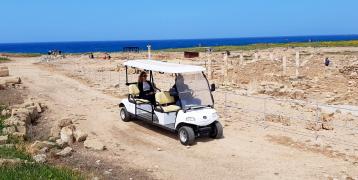Approaches to decarbonise the tourism sector

Tourism is a vital part of Europe’s economy, accounting for more than 570 billion EUR gross value added per year, and employing more than 11 million people. While the industry suffered significant impacts from the COVID pandemic and energy crisis, regions have been keen to restart and boost the tourism sector, and it continues to grow with the number of foreign visitors up by 6% compared to 2019.
While it brings many economic benefits, tourism is also a carbon-intensive industry, estimated to contribute around 8% of global carbon emissions – from transport, lodgings and services, amongst other sectors. There is, therefore, a need to cut emissions, requiring support mechanisms and strategies from public authorities to stimulate investment in sustainable alternatives and increase energy efficiency and use of renewable energy.
This will require collaboration between governments, businesses, and consumers, as explored by several Interreg Europe projects such as DETOCS, DESTI-SMART, ECO-CICLE and LAST MILE.
Sustainable transport for tourism
Air travel for tourism remains the main carbon emitter in the sector. As such, public authorities can encourage using more sustainable modes for short- to mid-distance travel, in particular encouraging a shift to rail. This can include, for example, the combination of rail ticketing with discounts on touristic offers like museums and heritage buildings, to encourage purchasing of train tickets in a package deal.
Regions that have very high tourist numbers can suffer significant disruption, often with seasonal peaks, which can be challenging to deal with. Touristic regions need to consider these impacts in their overall mobility strategies, such as in Thessaloniki’s 2030 Resilience Strategy.
The Strategy aims to get tourists to visit sites beyond the city centre, thus reducing overtourism and disruption in the city, by providing sustainable options to get to other touristic locations. These include new mobility solutions to encourage walking, cycling and public transport use, such as a bicycle sharing scheme and a new cycling network designed around commuting patterns and the creation of a cultural and tourist route.
Indeed, cycling tourism has high potential, as identified in several good practices, such as the German riverside cycle paths in North Rhine-Westphalia which connect areas of natural beauty with areas of cultural heritage to provide a touristic cycling offer, and the Iron Curtain Trail through Eastern Europe.
In other cases, regional and local transport offers may be provided specifically for tourists, to reduce the need to use private cars, especially for last-mile journeys. These can include on-demand services and e-vehicle sharing schemes, as well as heritage train routes that combine mobility offers with cultural heritage, for example in Košice, Slovakia, and Pomorze, Poland.
Improving tourist accommodation
Another aspect of tourism that needs intervention is accommodation, including hotels and resorts. Interventions here require not only energy efficiency improvements but also integration of renewable energy technologies, as in Galomar, Madeira’s first self-sufficient hotel, which is fully powered by solar thermal and solar photovoltaic systems.
Energy audits for hotels are also a key tool for improving performance, helping identify areas where consumption can be improved to bring down costs and reduce carbon emissions. The ECO-HOTEL PLUS platform implemented in Greece, is an energy audit scheme designed specifically for hotels.
The audit software is accompanied by a certification scheme, with three levels – certified, for hotels that have performed audits; gold, for those that audit and demonstrate greenhouse gas emissions reductions, and platinum, for those that also engage in offsetting for their remaining carbon emissions. Such certification schemes can be influential for eco-conscious tourists, looking to reduce the environmental impact of their journeys.
In contrast to ECO-HOTEL, which is a paid service, Nicosia Municipality (Cyprus), took the lead in funding energy audits by establishing a revolving fund backed with revenues raised from a green tax which is applied as a small increase to accommodation taxes. Nicosia estimated that the tax raises 21,000 EUR per year, which can then be invested into the audit scheme.
Further resources
For more information and resources see the collection page on sustainable tourism, or see our webinar on smart energy management for more on ECO-HOTEL PLUS. You can also find more good practices via the websites of:
And explore our policy briefs:









